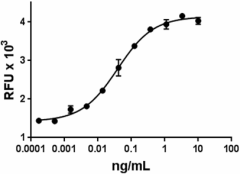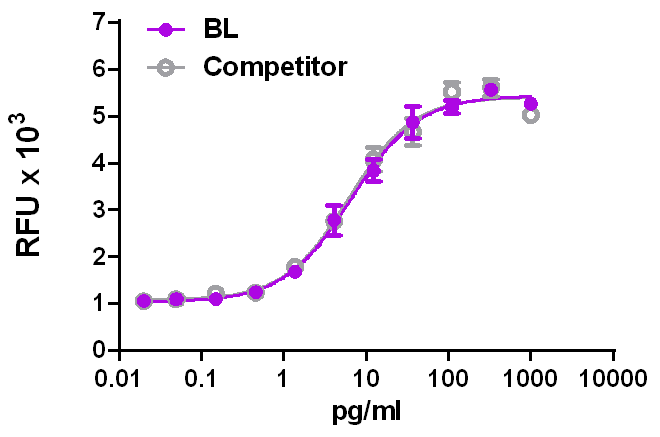- Regulatory Status
- RUO
- Other Names
- Il-1f11, Nuclear factor from high endothelial venules (NF-HEV)
- Ave. Rating
- Submit a Review
- Product Citations
- publications

-

Mouse IL-33 induces the proliferation of D10.G4.1 mouse T lymphocytes in a dose dependent manner. -

IL-5 induction by mouse IL-33 in splenocytes activated by anti-CD3 and anti-CD28. Data kindly provided Dr. Foo Y. Liew. -

Recombinant mouse IL‐33 induces proliferation in murine helper T lymphocyte (Th‐2) D10.G4.1 cells in a dose dependent manner. BioLegend’s product was compared side‐by‐side to the leading competitor's equivalent product.
IL-33 belongs to the IL-1 family and is closely related in structure to IL-18 and IL-1b. IL-33, IL-1b, and IL-18 are synthesized as biologically inactive precursor and are cleaved by the enzyme caspase-1 to be secreted as active mature forms. IL-33 stimulates target cells by binding to the IL-1R/TLR superfamily member ST2 and subsequently activates NF-κB and MAPK pathways via identical signalling events to those observed for IL-1b. In addition, IL-33 is a nuclear factor (NF-HEV) abundantly expressed in high endothelial venules from lymphoid organs that associates with chromatin and exhibits transcriptional regulatory properties.
Product DetailsProduct Details
- Source
- Mouse IL-33, amino acids Ser109-Ile266 (Accession# AAH03847.1) was expressed in E. coli.
- Molecular Mass
- The 158 amino acid recombinant protein has a predicted molecular mass of approximately 17,554 Da. The DTT-reduced and non-reduced protein migrate at approximately 20 kDa by SDS-PAGE. The N-terminal amino acid is Serine.
- Purity
- Purity is > 98%, as determined by Coomassie stained SDS-PAGE.
- Formulation
- 0.22 µm filtered protein solution is in 20 mM HEPES, 150 mM NaCl, pH 7.2, 10 mM TCEP.
- Endotoxin Level
- Endotoxin level is < 0.1 EU/µg (< 0.01ng/µg) protein as determined by the LAL method.
- Concentration
- 10 and 25 µg sizes are bottled at 200 µg/mL. 100 µg size and larger sizes are lot-specific and bottled at the concentration indicated on the vial. To obtain lot-specific concentration and expiration, please enter the lot number in our Certificate of Analysis online tool.
- Storage & Handling
- Unopened vial can be stored between 2°C and 8°C for up to 2 weeks, at -20°C for up to six months, or at -70°C or colder until the expiration date. For maximum results, quick spin vial prior to opening. The protein can be aliquoted and stored at -20°C or colder. Stock solutions can also be prepared at 50 - 100 µg/mL in appropriate sterile buffer, carrier protein such as 0.2 - 1% BSA or HSA can be added when preparing the stock solution. Aliquots can be stored between 2°C and 8°C for up to one week and stored at -20°C or colder for up to 3 months. Avoid repeated freeze/thaw cycles.
- Activity
- ED50 = 0.0125 - 0.0625 ng/ml determined by the dose dependent stimulation of D10.G4.1 cell proliferation.
- Application
-
Bioassay
- Application Notes
-
BioLegend carrier-free recombinant proteins provided in liquid format are shipped on blue-ice. Our comparison testing data indicates that when handled and stored as recommended, the liquid format has equal or better stability and shelf-life compared to commercially available lyophilized proteins after reconstitution. Our liquid proteins are verified in-house to maintain activity after shipping on blue ice and are backed by our 100% satisfaction guarantee. If you have any concerns, contact us at tech@biolegend.com.
-
Application References
(PubMed link indicates BioLegend citation) - Product Citations
-
Antigen Details
- Distribution
-
High levels of mouse IL-33 mRNA are detected in the stomach, lung, spinal cord, brain, and skin. Expression within these organs is restricted to a few cell types, such as epithelial cells, fibroblasts, and smooth muscle cells. In addition, mouse IL-33 mRNA is found in resting dendritic cells and activated macrophages. Endothelial cells constitute a major source of IL-33 mRNA in chronically inflamed tissues.
- Function
- IL-33 drives production of Th2-associated cytokines from in vitro polarized Th2 cells. In mice, IL-33 injection induced the expression of IL-4, IL-5, and IL-13 and led to severe pathological changes in the lung and the digestive tract. In addition, IL-33 acts as a chemoattractant for Th2 cells, both in vitro and in vivo. TNF-α and IL-1β are activators of IL-33 transcription in fibroblasts and keratinocytes.
- Ligand/Receptor
- IL-33 binds to the IL-1 family receptor T1/ST2 and IL-1RAcP (IL-1 receptor associated protein)
- Biology Area
- Cell Biology, Immunology, Stem Cells
- Molecular Family
- Cytokines/Chemokines
- Antigen References
-
1. Schmitz J, et al. Immunity 2005 23:479-490.
2. Barksby HE, et al. C Exp Immunol 2007 149:217-225.
3. Arend WP, et al. ImmRev 2008 223:20-38.
4. Suzukawa M, et al. J. Immunol. 2008 181:5981-5989.
5. Moussio C, et al. PlosOne 2008 10:e3331. - Gene ID
- 77125 View all products for this Gene ID
- UniProt
- View information about IL-33 on UniProt.org
Related FAQs
- Why choose BioLegend recombinant proteins?
-
• Each lot of product is quality-tested for bioactivity as indicated on the data sheet.
• Greater than 95% Purity or higher, tested on every lot of product.
• 100% Satisfaction Guarantee for quality performance, stability, and consistency.
• Ready-to-use liquid format saves time and reduces challenges associated with reconstitution.
• Bulk and customization available. Contact us.
• Learn more about our Recombinant Proteins. - How does the activity of your recombinant proteins compare to competitors?
-
We quality control each and every lot of recombinant protein. Not only do we check its bioactivity, but we also compare it against other commercially available recombinant proteins. We make sure each recombinant protein’s activity is at least as good as or better than the competition’s. In order to provide you with the best possible product, we ensure that our testing process is rigorous and thorough. If you’re curious and eager to make the switch to BioLegend recombinants, contact your sales representative today!
- What is the specific activity or ED50 of my recombinant protein?
-
The specific activity range of the protein is indicated on the product datasheets. Because the exact activity values on a per unit basis can largely fluctuate depending on a number of factors, including the nature of the assay, cell density, age of cells/passage number, culture media used, and end user technique, the specific activity is best defined as a range and we guarantee the specific activity of all our lots will be within the range indicated on the datasheet. Please note this only applies to recombinants labeled for use in bioassays. ELISA standard recombinant proteins are not recommended for bioassay usage as they are not tested for these applications.
- Have your recombinants been tested for stability?
-
Our testing shows that the recombinant proteins are able to withstand room temperature for a week without losing activity. In addition the recombinant proteins were also found to withstand four cycles of freeze and thaw without losing activity.
- Does specific activity of a recombinant protein vary between lots?
-
Specific activity will vary for each lot and for the type of experiment that is done to validate it, but all passed lots will have activity within the established ED50 range for the product and we guarantee that our products will have lot-to-lot consistency. Please conduct an experiment-specific validation to find the optimal ED50 for your system.
- How do you convert activity as an ED50 in ng/ml to a specific activity in Units/mg?
-
Use formula Specific activity (Units/mg) = 10^6/ ED50 (ng/mL)
 Login/Register
Login/Register 














Follow Us